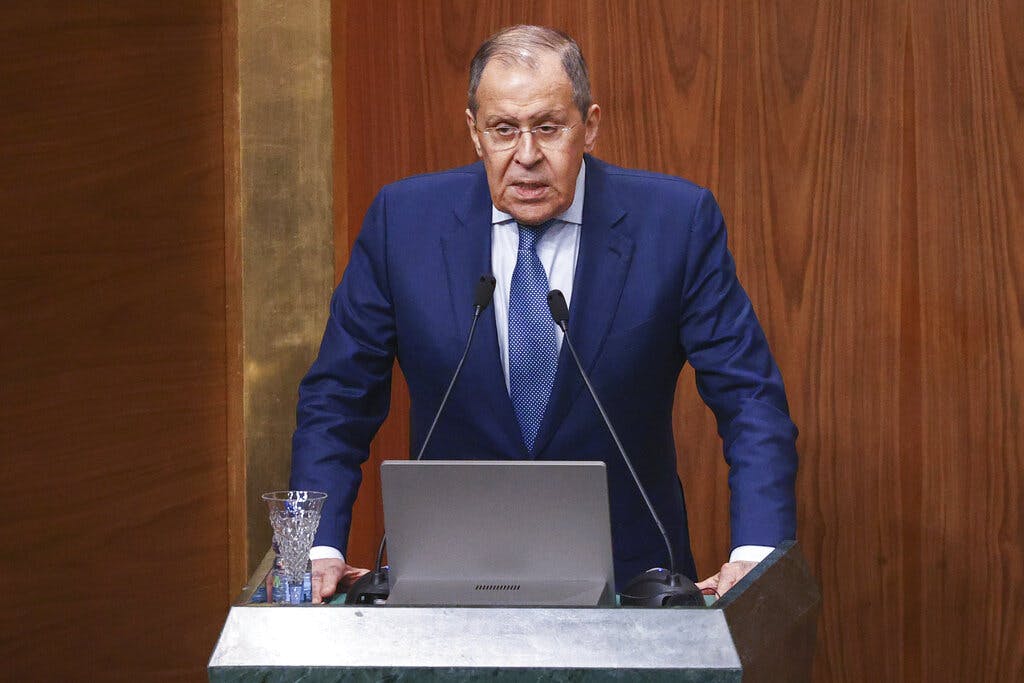Russia, After Years of Bashing America Over Regime Change, Admits That’s the Goal in Ukraine
Even after invading its neighbor in February, Moscow publicly held on to the fiction that changing rulers is something done by America alone.

More than anyone in recent history, the Russian foreign minister, Sergei Lavrov, has turned the words “regime change” into a slur against America. Now, after acknowledging that regime change is Moscow’s top goal in Ukraine, he may have to change his tune.
Even after invading its neighbor in February, Russia publicly held on to the fiction that changing rulers for geostrategic purposes, ideology, or sheer malice is something done by America, and America alone. “We are not up for regime change in Ukraine,” Mr. Lavrov said in April, according to the TASS news agency. “We want the people to be free to decide how they want to live in Ukraine.”
Then, the tea finally spilled from the Kremlin’s samovar last night. Speaking to envoys at an Arab League summit in Cairo, Mr. Lavrov said that Moscow is determined to help Ukrainians “liberate themselves from the burden of this absolutely unacceptable regime,” the Associated Press reports.
As ambassador to the United Nations and later as President Putin’s foreign minister, Mr. Lavrov railed at America’s tendency to liberate countries from the tyrants that rule them as the embodiment of evil. At the UN he used the term “regime change” so often that it became a Kremlin mantra and a go-to diplomatic cudgel with which to hit Washington.
On the eve of the Iraq war, as Russia, France, and others fought America, Britain, and our allies at the UN Security Council, this reporter briefly cornered Mr. Lavrov after a contentious UN press conference. I jokingly said that his style — cutting off reporters mid-sentence to correct the premise of their question — reminded me of that of the American defense secretary, Donald Rumsfeld.
Mr. Lavrov’s face darkened at the mere suggestion. “I don’t seek regime change in other countries,” he shot back tersely, and walked away.
The seeds of Russia’s crusade against American regime-toppling were sown prior to the Iraq war. The Kremlin was angered by President Clinton’s interference in the Balkan wars, which led to the successful removal from power of the Russian ally at Belgrade, Slobodan Milosevic.
Tensions between America and Russia intensified significantly after President Obama succumbed to European pressure to oust the Libyan dictator, Muammar Qaddafi: In 2011 Russia agreed to abstain on a UN Security Council resolution that authorized a no-fly zone and the use of “all necessary measures” to protect civilians in Libya.
After Qaddafi was overthrown and killed, the Kremlin vowed never again. Turtle Bay diplomats date the current Security Council dysfunction to that 2011 Libya resolution. In explaining Russia’s frequent council vetoes, its diplomats claim that America disguised its real goal — regime change in Libya — under a humanitarian resolution. Moscow will never be fooled again, these diplomats now say as they cast one Security Council nyet vote after another.
Yet was Moscow really ever so averse to regime change?
During the Cold War, America was often berated about the toppling of regimes, like those of Iran’s Mohammad Mossadegh, Guatemala’s Jacobo Arbenz, Vietnam’s Ngo Dinh Diem, and Chile’s Salvador Allende.
The “ugly American” tag was popularized by Western academics, politicians, and spy novelists including the innovative Graham Greene. The Soviet propaganda machine enthusiastically adopted the tag. It oozed scorn over Washington’s real and imagined interference in countries’ affairs, and was gleeful when attempts at regime change failed, as in Fidel Castro’s case.
The communists, however, were no innocent bystanders in the regime-change game. They supported Castro’s overthrow of Bautista and backed other anti-American regimes in the hemisphere. In Europe, they sent tanks to Czechoslovakia, ending Alexander Dubcek’s 1968 Prague Spring. They backed and overthrew various regimes in the Mideast, Africa, and east Asia.
Beyond former Soviet republics — Georgia, Ukraine — Moscow, at times violently, constantly interferes in the internal politics of countries in our backyard and elsewhere.
In 2012 Mr. Obama refused to enforce his own red line on the use of chemical weapons in Syria. Moscow soon rushed to defend President Assad’s homicidal regime and turned Syria into a Russian satrap — which didn’t stop Mr. Lavrov from gloating over America’s military weakness in Syria.
“This is not the first time different U.S. administrations place the task of changing the regimes they dislike above common goals of eradicating terrorism and extremism,” Mr. Lavrov said in August 2018. “This was in Iraq and Libya, and they are trying to do so in Syria — I would even say they tried to do so in Syria, and they failed.”
No one expects consistency from the Kremlin. Yet, can Russia’s attempt at regime change in Ukraine — now openly acknowledged — succeed? Or can America and our allies deal Moscow a defeat akin to our just, though feeble and ultimately unsuccessful, attempt at a Damascus regime change?

